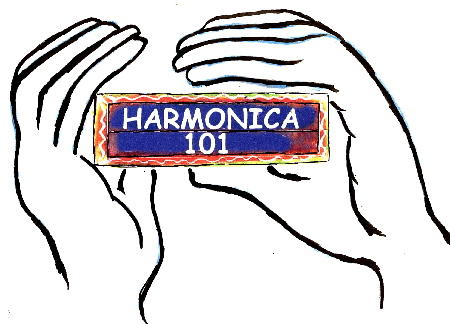Beginners luck
Harmonica lessons .com
Please visit his site and enjoy this beginners lesson....
peace, mc
 ps.. his site is a pay site, but its worth every penny...
ps.. his site is a pay site, but its worth every penny...LET'S START AT THE TOP
You will need a standard 10-hole diatonic harmonica in the key of "C" for the instruction on this site. Double rowed harmonicas (sometimes 8, 10, or 12 sets of double holes) are called Tremolo harmonicas and they along with chromatic harmonicas are not the proper types of harmonicas for our instruction.
Key of "C" Diatonic (standard 10-hole) Harmonica- You'll need a good quality diatonic type harmonica to learn and practice on. This is what you need for most blues, folk, rock, and country styles. We like the Lee Oskar Major Diatonic and the Hohner Special 20 (both in the key of "C") best for players just starting out. The Lee Oskar is a bit more expensive, but worth the price for its consistent volume, tone, and durability. The Hohner Special 20 is one of the best diatonics around for the money. They may not last as long as some other models, but like the Lee Oskar, they sound and play great. (Can't decide? Pick one, and try the other when you need to buy another key.)
Will my harmonica work with this site?- Visit the "Recommended Harmonicas For Our Instruction" page for lists of the 'Recommended', 'Acceptable', and 'NOT Recommended' models and brands. You can refer to this section, General Overview, for more information on diatonic vsChromaticic harmonicas as well as; some basic 1st and 2nd position harmonica theory, and a "Chart of Harmonica Keys & Positions" for jamming to songs. By the way, quick definitions of harmonica related terms like "diatonic" and "key" can be found in the Terms & Definitions section.
Stick with a basic 10 hole harmonica in the key of "C"- Diatonic harmonicas come in all twelve keys (G, Ab, A, Bb, B, C, Db, D, Eb, E, F, F#), but for beginners it's easier if you start with a basic 10 hole harmonica in the key of "C" (generally speaking, the "G" harmonicas are very low and the "F" and "F#" harmonicas are very high pitch-wise, while the "C" is right in the middle). Key of "C" harmonicas is the most common, and they also make understanding music theory much easier.
Should I buy other key diatonic harmonicas as well?- As you improve and begin to play with others or start playing along with CDs, you will want to pick up some of the other key diatonics. The "C", "A", "D", "F", and "G" keys are a good place to start- in roughly that order. The key of harmonica you need is determined by the key the song is in and usually set by the singer. If you are not playing along with other people or with CDs, all you need is a key of "C" for now.
Will a key other than "C" work at this site?-You should note that all keys of standard diatonic harmonicas are layed out and played the same way. That is, if you already own a standard 10-hole diatonic in a key other than the key of "C" (like an "A" or "D" for instance); it will work for the instruction and songs on this site. But, make the key of "C" your next purchase.
A cheap harmonica is tough to learn on- Prices may vary, but it is best to buy one for no less than $17 to $25, because a cheap harmonica can be extremely difficult to learn on. Poor construction of inexpensive harmonicas causes them to leak air and makes them hard to play and difficult to learn important techniques like bending.
Avoid these diatonics, and possibly 'upgrade'- Avoid wooden combed harmonicas if you are just starting out for the same air leak problems mentioned above. The harmonicas that are included in the 'Book with CD (or Cassette Tape) and Harmonica' packages are not recommended either. These are very inexpensive harmonicas that are included in the package for convenience, but are typically of low quality. If you have any serious intentions at all with the harmonica, you should plan on an 'upgrade'.
Should I buy a used one?- This is entirely up to you. But, we don't recommend it for obvious health reasons, and the fact that a brand new pro quality diatonic is between $20 and $30. Also, harmonicas do wear out over time. It's best to start with one that you know is in good condition and plays in tune.
Tremolo, chromatic, and "odd" harmonicas won't work with the instruction here- Double rowed harmonicas (sometimes 8, 10, 12, or more sets of double holes) are called Tremolo harmonicas and they along with chromatic harmonicas (the one with the button on the side) will not work well with the instruction at this site. Visit this page, "Recommended Harmonicas for Our Instruction", for lists of the Recommended, Acceptable, and NOT Recommended models and brands.


0 Comments:
Post a Comment
<< Home